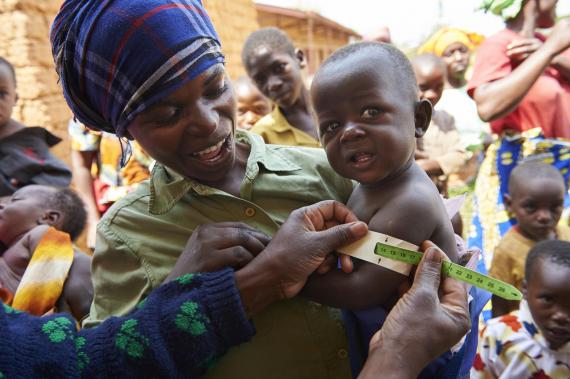Health care should be equitable. This means it must be accessible to anyone, regardless of social class, or place of residence. For a pregnant woman dwelling either in the hills of Rwanda, or in the deserts of Niger Republic, comprehensive antenatal care and support is very important. The work of providing critical care to women and children in the last mile is enormous, requiring passion and tenacity. One group of health care workers who do this work consistently is community health workers (CHWs).
In the African scenario where the shortage of health workers often diminishes optimal healthcare delivery, CHWs fill the void in rural communities, providing care and saving lives. They are usually members of the communities they are working in and receive shorter training than conventional health professionals. In many African communities, they are the first port of call for health care seekers, particularly pregnant women.
Several African countries have different models of using CHWs to provide community care. Overall, the outcomes are similar, saving lives and preventing complications for the most vulnerable, often hard to reach people on the continent. In the first of a two-part series on the work of CHWs in African countries, we chronicle Rwanda’s CHW system.
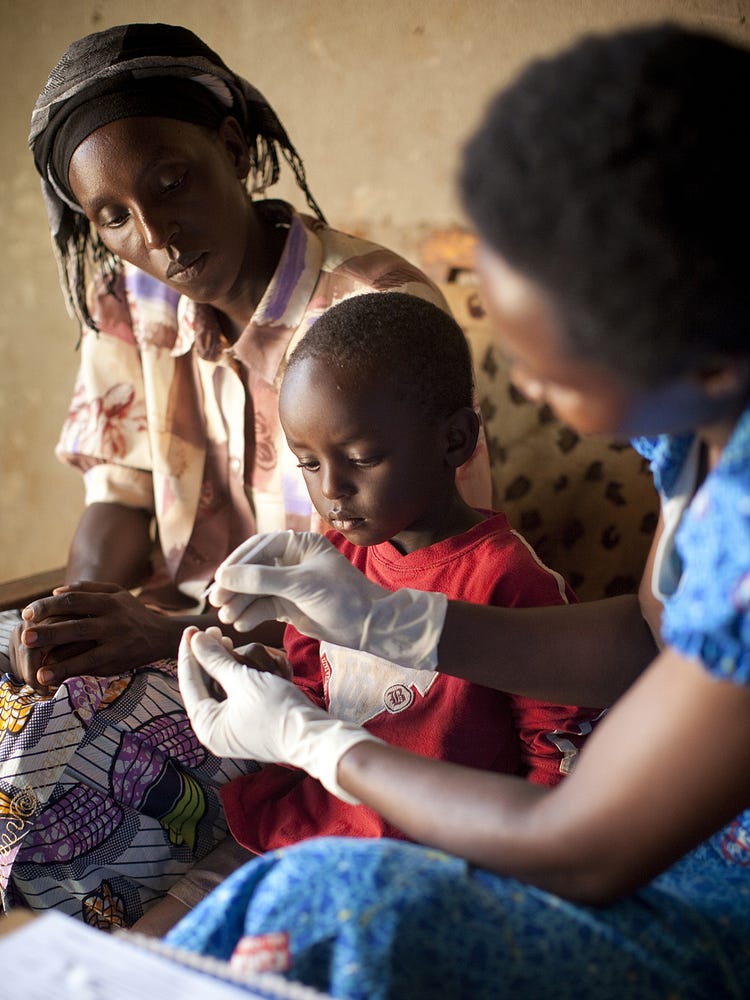
An All-inclusive Care Approach
Rwanda is a landlocked country in east Africa with a population of 13 million people. One of Africa’s shining lights in the continent’s drive towards universal health coverage, Rwanda’s CHW approach is one that ensures access to quality healthcare in every community. Started in 1995 after the genocide, Rwanda’s CHW program is aimed at providing maternal and child healthcare in the country’s rural communities. In every community of between 50 and 150 households, three CHWs were stationed. Two of these, a male and female pair are referred to as binomes. They focus on identification and treatment of childhood diseases such as malaria, diarrhea, and malnutrition in the community, while also being responsible for the provision of contraceptives to community members. The third CHW, who must be female, focuses on the provision of care to pregnant and breastfeeding women, including antenatal, postnatal and delivery assistance.
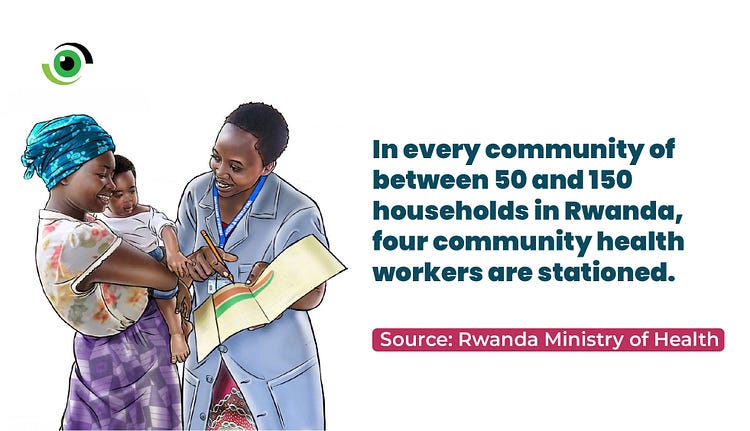
In 2018, the Rwandan government deployed an additional CHW to each village, with the purpose of providing care for chronic diseases like HIV, Tuberculosis, and palliative care for cancer patients. This additional CHW visits patients with chronic conditions to counsel them, ensure adherence to medications, and transport them to district hospitals if necessary. To ensure the delivery of quality care, the CHWs are trained on their area of concentration as assigned by the Ministry of Health.
To become a CHW, at least a secondary school education is necessary. CHWs work as volunteers in the country so, they do not receive a salary. They are compensated through performance-based incentives, based on certain indicators like the number of patients assisted or referred. These incentives are coordinated by the CHWs themselves through various cooperatives.
At over 45,000, Rwanda’s CHW network is the largest single group of healthcare providers in the country. They are available in every community, village and district. According to Dr. Carolyn Aling, a consultant gynecologist at King Faisal Hospital in the country’s capital, Kigali, the services they provide have helped improve the country’s health indices, especially for maternal and child health. “The fact that these CHWs are trained to identify pregnant women with high risks has helped a lot in early referral and management. That has contributed to reduced incidences of complications and even deaths’’. Dr Aling also pointed out that prolonged labor is another problem the CHWs are helping to avert. As the CHWs live in the communities, they have a register of every woman who is pregnant or breastfeeding.
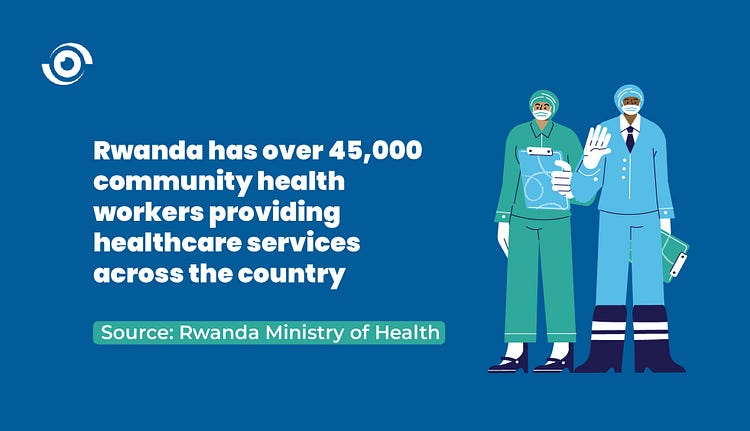
Aside from monitoring antenatal attendance in health facilities, they also keep track of pregnancies. Women whose expected delivery dates are close are kept on notice to alert the CHWs immediately they present signs of labor. The CHWs usually take women to health facilities for delivery and accompany them to district hospitals if necessary. As a result, prolonged labor is prevented and the complications that may arise are averted.
Successes of the CHW Program
Rwanda has a three-tier health care system: Community health centres to which the CHWs are attached, district hospitals that receive referrals from the community health centres and tertiary hospitals. The referral system ensures that CHWs are the first port of call for people seeking care and refer people to community health centres. Cases that cannot be handled at the health centres are referred to district hospitals and if necessary, tertiary hospitals. This process allows district and tertiary hospitals to attend to cases requiring specialised care.
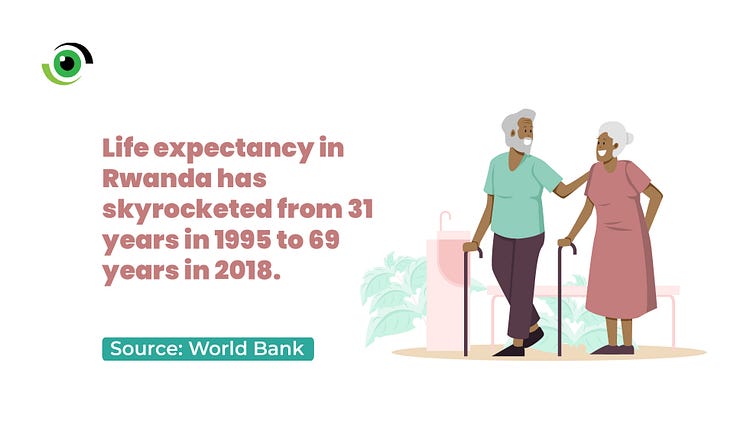
According to Dr. Fernand Rwamwejo who works with Babyl Health, a digital health company based in Kigali, CHWs in Rwanda are the bedrock of the country’s health system. ‘’If not for them, our tertiary health facilities would have long been overwhelmed. They are basically the backbone of our primary health care system which now caters for a majority of the healthcare needs of our people.’’ Ambroise Murindangabo, a former CHWs supervisor at Burera district, believes that their work was the main catalyst for Rwanda’s achievement of the Millennium Development Goals (MDGs). ‘’The way they help people get healthcare services through the mountainous terrains has made life easier for, especially women and children’’ Murindangabo, who worked with the CHWs from 2012 to 2018 said. He added that the work the CHWs do is mainly out of passion and love for their communities, as they leave their farms and other sources of livelihood to provide care to the people.
Life expectancy in Rwanda has skyrocketed from 31 years in 1995 to 69 years in 2018, one of the highest on the continent. Maternal mortality, which was 1,160 per 100,000 live births in 2000 has reduced tremendously to 248 per 100,000 in 2017. Infant mortality also dropped from 120 per 1000 live births in 1995 to 26 per 1000 live births in 2019. These successes, both Dr. Aling and Dr. Rwamwejo believe, are largely due to the work of CHWs in Rwandan communities.
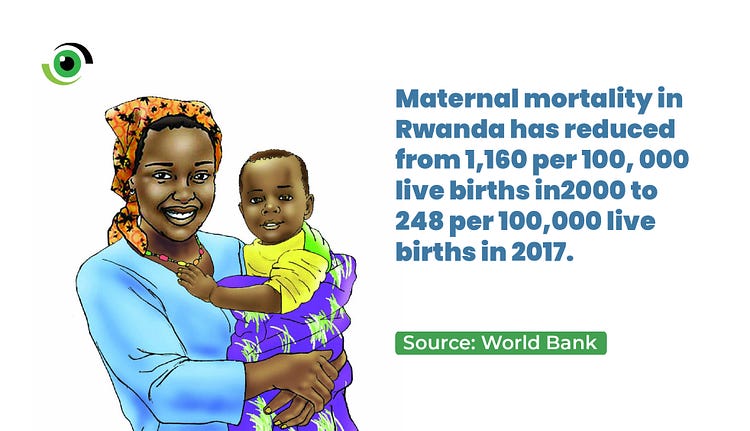
The success of Rwanda’s CHW program can be attributed to several factors including greater coordination. Arguably, the biggest contributor to this success is Rwanda’s health insurance policy. Under the policy, no Rwandan, regardless of socioeconomic status, is denied the care they need. People in communities who are not able to afford health insurance are supported by the government. This means lack of money is not a barrier to seeking care. ‘’A pregnant woman does not worry about money for antenatal and during delivery, even if she requires a cesarian section in the district or tertiary hospitals, she does not have to pay’’, said Dr. Aling. This has created trust in the system and for the CHWs, such that whenever they refer an individual to a health facility, there is no reason for them to refuse.
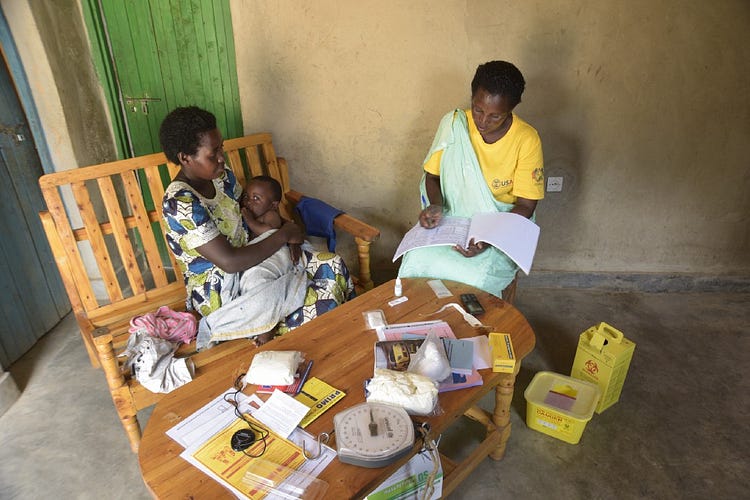
Room for improvement
CHWs contribute significantly to healthcare delivery across several African countries. They have bridged the critical gap in human resource for health in the last mile, and their positive impact across the continent must be commended. However, most CHWs work as volunteers, receiving only a stipend for their services which is usually not enough to cover their basic needs. This is demotivating and goes against the principles of equity itself. Rwanda is leveraging the CHW program to drive healthcare provision in rural communities, it is paramount that the country provides proper compensation for them. This includes enrolling them into the civil service as fulltime employees, with full benefits. Such a move will encourage the Community Health Workers and ensure that the equity we advocate for in healthcare delivery is also enjoyed by those providing the care.


